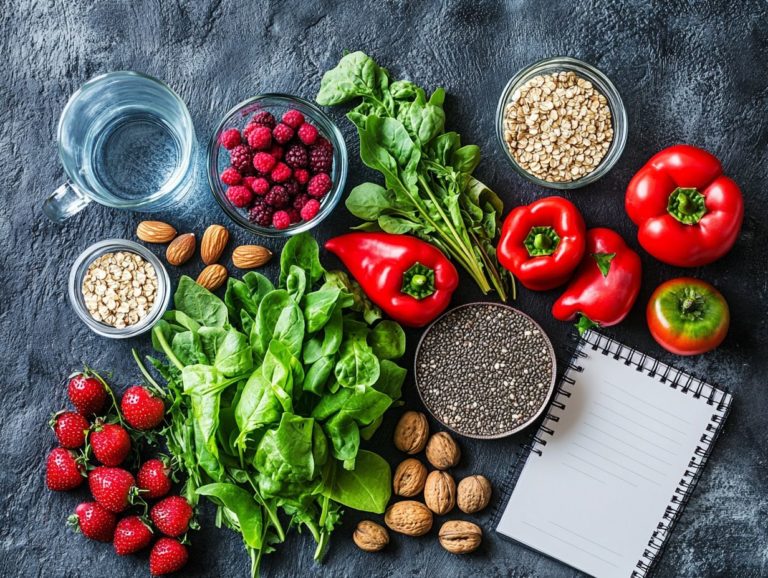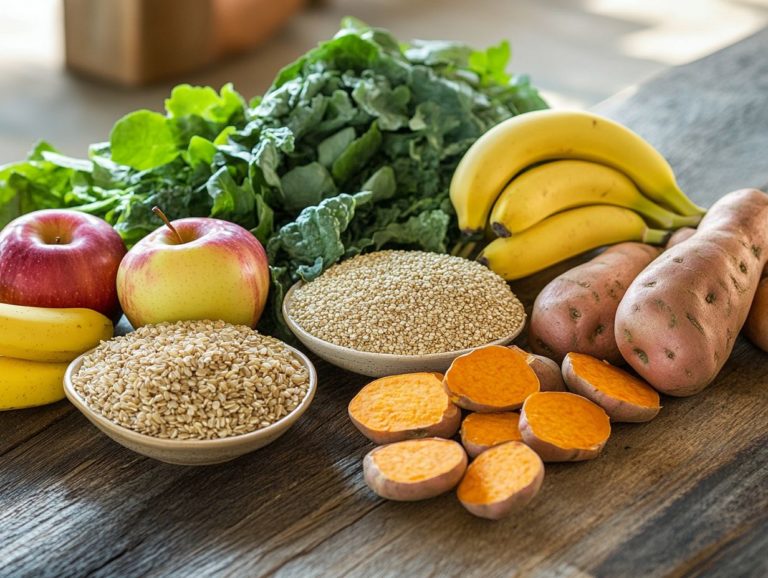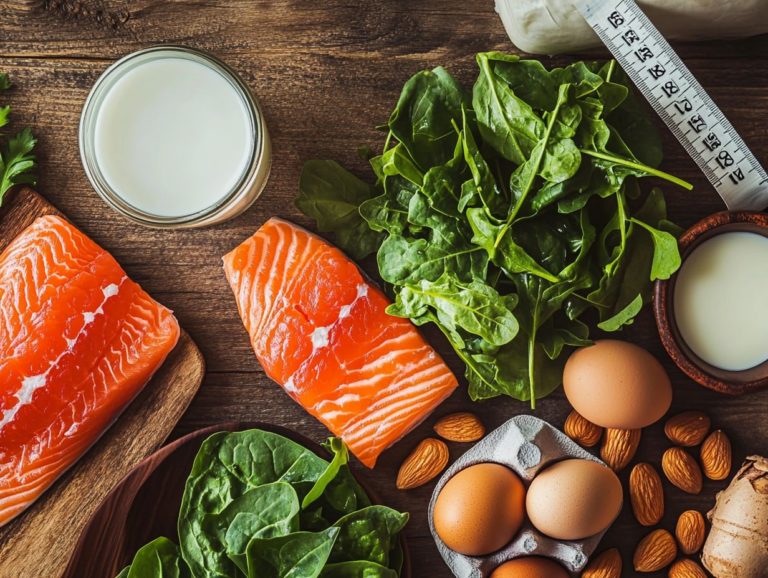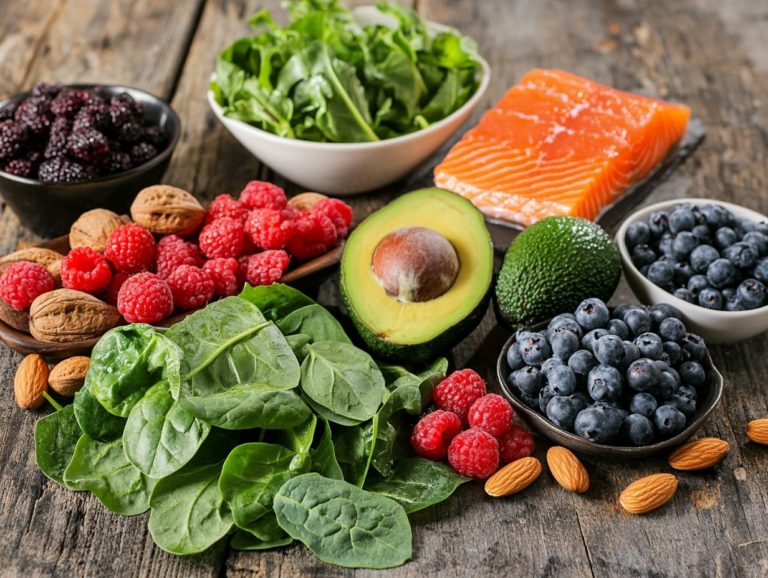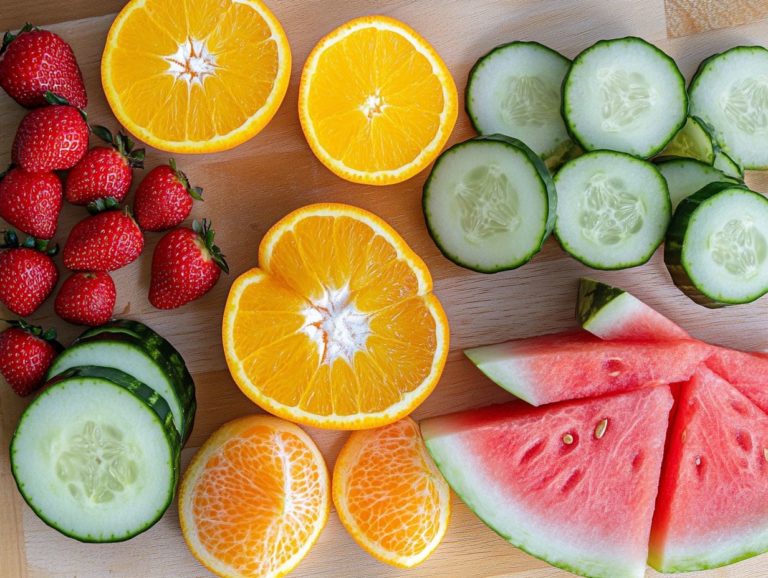5 Foods High in Antioxidants You Should Try
Are you eager to elevate your health with delicious foods? Antioxidants are key players in protecting your body against oxidative stress and inflammation, making them vital for your overall well-being.
This article delves into five exceptional foods rich in antioxidants, from luscious berries to rich dark chocolate. You ll discover how these potent compounds work, get tips for seamlessly incorporating them into your meals, and learn about any potential risks to consider.
Don’t miss out on these health-boosting foods; start adding them to your diet today!
Contents
- Key Takeaways:
- 1. Berries
- 2. Dark Leafy Greens
- 3. Nuts and Seeds
- 4. Beans and Legumes
- 5. Dark Chocolate
- What Are Antioxidants and Why Are They Important?
- Frequently Asked Questions
- What are some foods that are high in antioxidants?
- Why are antioxidants important for our health?
- How many servings of these antioxidant-rich foods should I consume?
- Can I get enough antioxidants from supplements?
- What are the other benefits of eating foods high in antioxidants?
- Can I enjoy these foods if I have food allergies or dietary restrictions?
Key Takeaways:
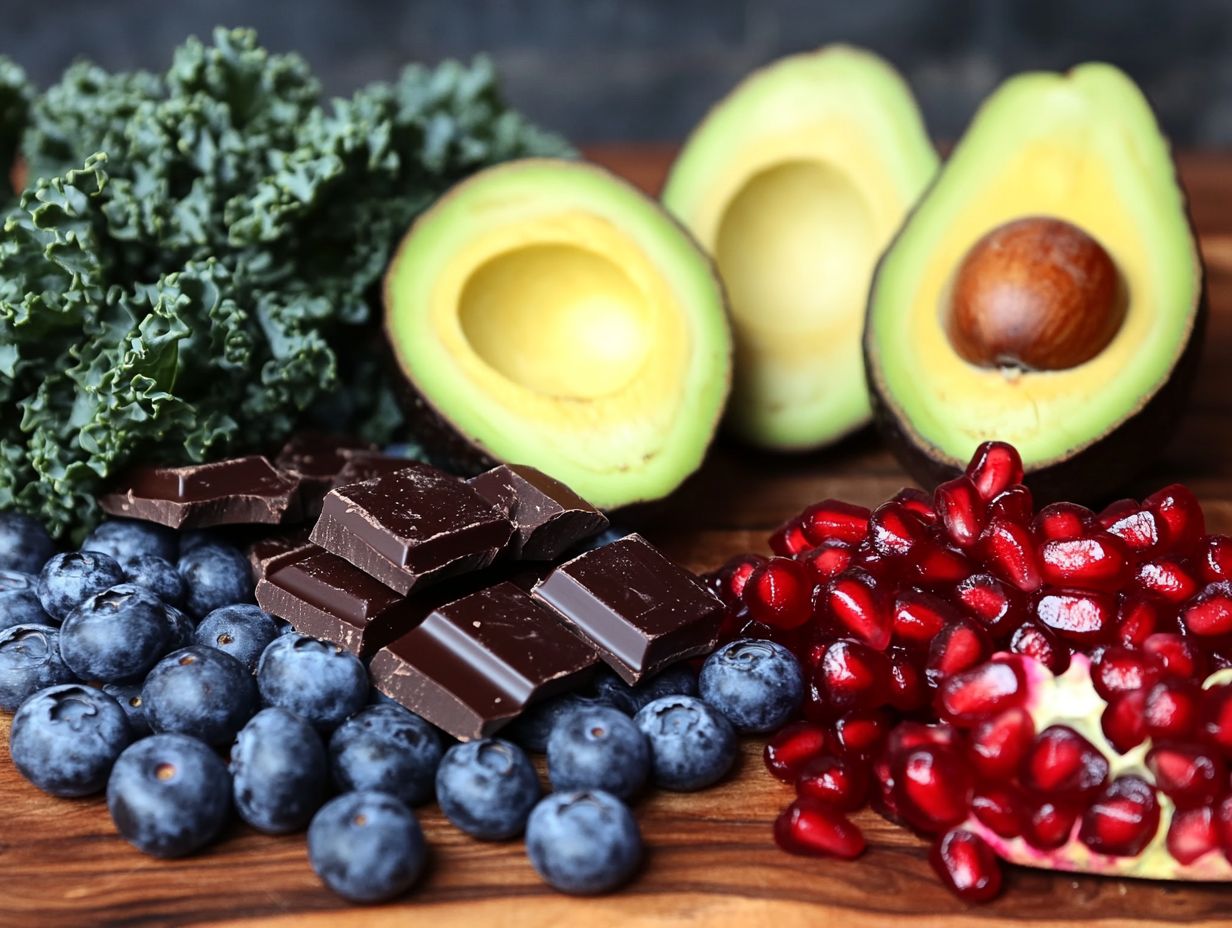
Boost your antioxidant intake by incorporating these 5 delicious foods into your diet: berries, dark leafy greens, nuts and seeds, beans and legumes, and dark chocolate.
Antioxidants help protect our cells from damage caused by harmful molecules and may have health benefits, such as reducing the risk of chronic diseases.
While it is important to consume antioxidant-rich foods, maintain a balanced diet and don’t rely solely on these foods for all of your nutrient needs.
1. Berries
Berries, such as blueberries, strawberries, and raspberries, are your nutritional allies packed with antioxidants that fight free radicals while delivering essential vitamins and minerals. Incorporating these delightful fruits into your diet supports your overall health and helps reduce the risk of chronic diseases.
Each berry has its own distinct blend of flavonoids and polyphenols, making them invaluable for enhancing immune function and protecting your cells from oxidative stress.
For example, blueberries are rich in anthocyanins, which give them their gorgeous blue hue and promote heart health. Strawberries shine with their high vitamin C content, boosting both your skin s vitality and immune support. Raspberries provide fiber and are loaded with ellagic acid, known for its anti-inflammatory benefits.
Incorporating these vibrant fruits into your breakfast is easy add them to yogurt or oatmeal. You can also toss a handful into your smoothie for a deliciously nutritious drink.
For a quick snack, consider adding them to a salad or enjoying them with a sprinkle of dark chocolate for a healthy treat.
2. Dark Leafy Greens
Dark leafy greens such as spinach, kale, and Swiss chard are incredibly nutrient-dense foods that offer a wealth of health benefits. They are rich in vitamins, minerals, and antioxidants, all crucial for reducing oxidative stress and enhancing your overall wellness.
These vibrant greens are flavorful and nutrient-dense, loaded with important nutrients like vitamin K, folate, and iron, vital for maintaining healthy bodily functions.
Their high antioxidant content combats inflammation, which helps lower your risk of chronic diseases, such as heart disease and diabetes.
To maximize the benefits from these greens, use cooking methods like steaming or saut ing with minimal oil to preserve their health-promoting properties. Toss them in salads with a light vinaigrette or blend them into smoothies for a quick nutrient boost.
Healthy eating can be both enjoyable and effortless.
3. Nuts and Seeds
Nuts and seeds, such as almonds, walnuts, and flaxseeds, are excellent sources of healthy fats and antioxidants, essential for bolstering immune function and lowering the risk of chronic diseases.
These tiny powerhouses are particularly abundant in omega-3 fatty acids, vital for reducing inflammation and fighting free radical damage in the body. Incorporating these nutritional gems into your daily meals can significantly enhance your overall well-being.
A handful of walnuts can transform an ordinary salad into a delightful dish, while sprinkling flaxseeds on yogurt or oatmeal elevates your breakfast to a new level of nourishment.
Blending almond butter into smoothies or using it as a dip for fruits offers a delightful snacking option that promotes heart health and boosts energy levels.
4. Beans and Legumes
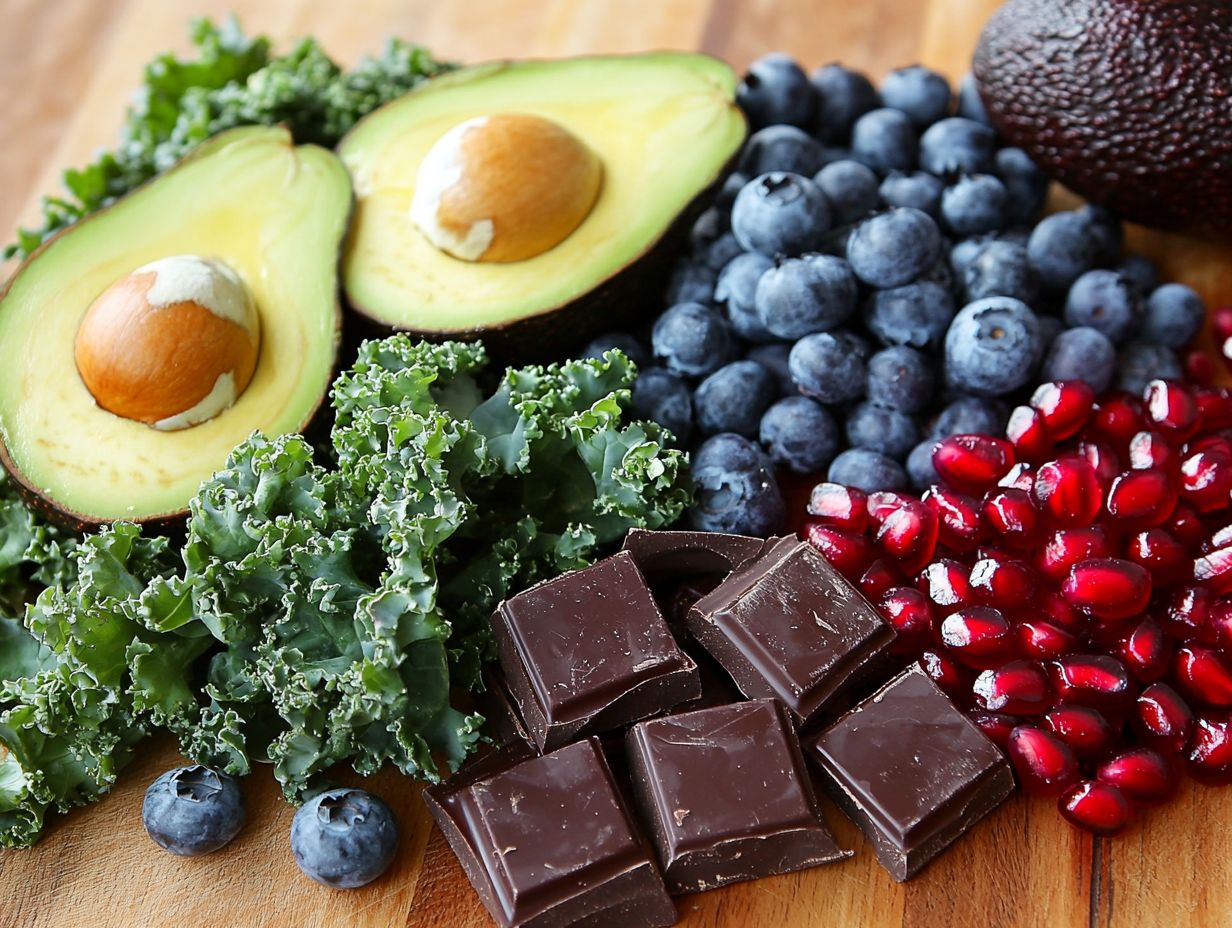
Beans and legumes, like lentils, chickpeas, and black beans, are great sources of protein. They are also rich in antioxidants, vitamins, and minerals, making them essential for a healthy diet.
These nutrient-packed foods support heart health and assist with weight management. Lentils are high in fiber, which helps regulate blood sugar levels.
Chickpeas shine in promoting digestive health, while black beans provide magnesium, crucial for muscle and nerve function.
Incorporating these versatile ingredients into your meals is simple and enjoyable. They can elevate salads with delightful texture, be blended into soups for creaminess, or serve as satisfying side dishes.
Embracing these legumes is a vital step toward achieving a balanced diet.
5. Dark Chocolate
Dark chocolate, especially varieties with high cocoa content, is a treasure trove of antioxidants, including flavonoids and polyphenols. It offers a range of health benefits, from protecting against free radical damage to enhancing heart health.
These antioxidants are essential for reducing inflammation and improving blood flow, contributing to a healthier heart and overall well-being. While indulging in these treats can be beneficial, moderation is key. A square or two lets you enjoy the rich flavors without excess.
Consider adding dark chocolate shavings to a smoothie bowl for a delectable breakfast or savoring a piece as a satisfying post-meal treat. This clever approach showcases the indulgent taste of dark chocolate while integrating its health benefits into your daily routine.
What Are Antioxidants and Why Are They Important?
Antioxidants are remarkable compounds that neutralize free radicals unstable molecules responsible for oxidative stress and cellular damage. They are vital for maintaining overall health and can help prevent chronic diseases.
Antioxidants come in various forms, including vitamins C and E, minerals like selenium, and phytochemicals found in fruits and vegetables. They stabilize free radicals by donating electrons, preventing potential harm.
Make sure to add antioxidants to your diet! They re vital for fighting aging and chronic diseases, such as heart disease and cancer. Without adequate antioxidants, your body may become vulnerable, leading to increased inflammation and a weakened immune system.
Prioritizing these compounds can make a significant difference in your health and longevity.
How Do Antioxidants Help the Body?
Antioxidants play a vital role by scavenging free radicals and reducing oxidative stress. This process is crucial since oxidative stress can lead to cellular damage and compromise immune function.
Antioxidants enhance your immune response by neutralizing harmful agents that threaten your cellular integrity. For instance, vitamins C and E, found in citrus fruits and nuts, do more than just protect against oxidative damage; they also boost immune cell production.
Antioxidants like beta-carotene, abundant in carrots and sweet potatoes, support the health of vital tissues and organs. By incorporating a diet rich in berries, dark leafy greens, and whole grains, you significantly contribute to this protective mechanism, ensuring your body remains resilient against various ailments.
What Are the Best Ways to Incorporate Antioxidant-Rich Foods into Your Diet?
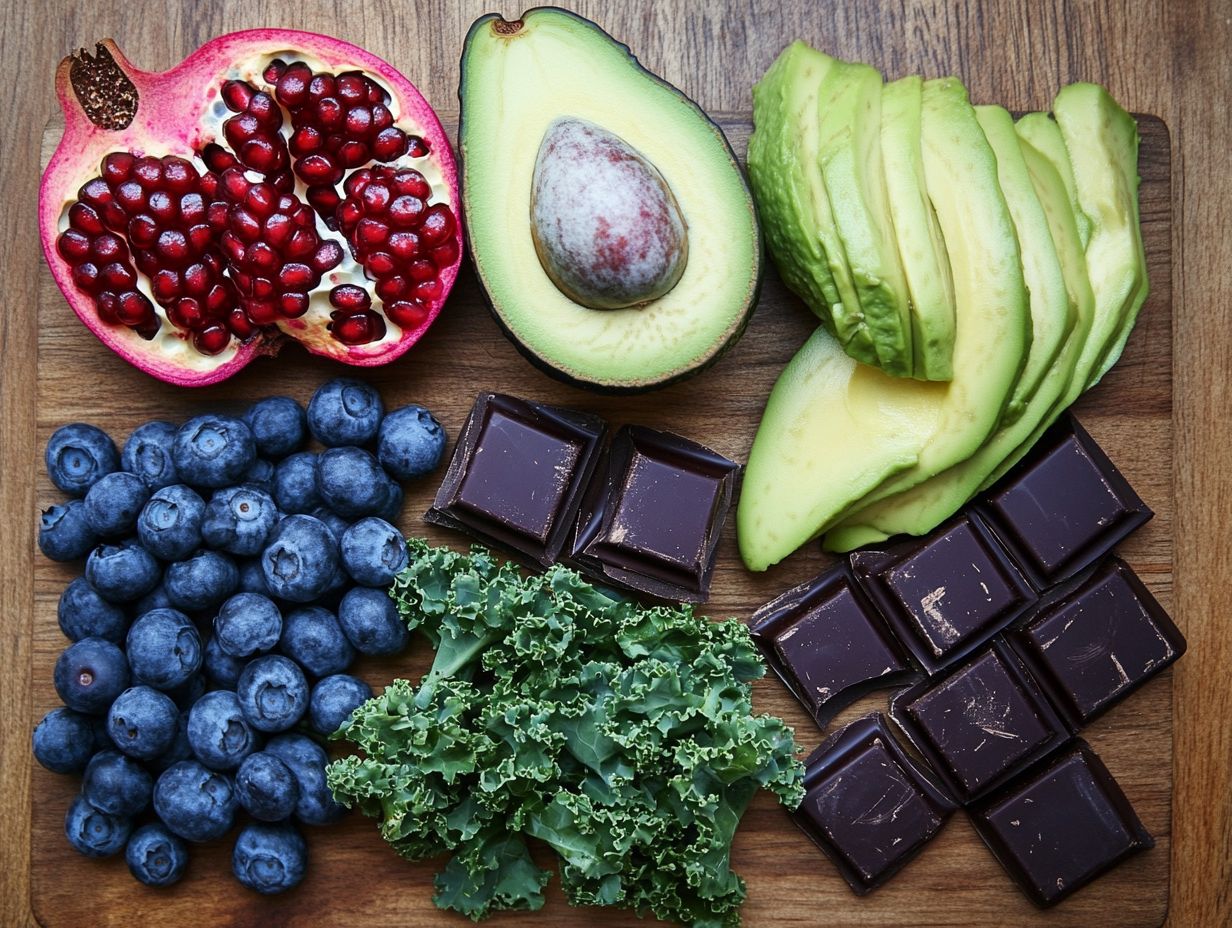
Incorporating antioxidant-rich foods into your diet can be a delightful way to boost your health. There are many delicious options that align with dietary guidelines and enhance nutrient absorption for optimal wellness.
To savor the benefits of these vibrant foods, try adding a handful of berries to your morning smoothie. This simple addition offers a sweet burst of flavor and nourishment.
When making salads, toss in refreshing leafy greens like spinach or kale. They enhance health benefits and provide a satisfying crunch.
If you’re feeling peckish, opt for nuts as a wholesome snack. Packed with healthy fats and protein, they are a perfect companion for your busy day.
By emphasizing a variety of these foods, you ensure a broad intake of nutrients, maximizing health benefits while keeping meals exciting.
Can You Get Too Many Antioxidants?
While antioxidants are essential for your health, it’s crucial to recognize that excessive intake especially from supplements can pose potential risks. Following dietary guidelines for balanced nutrition is key.
You might think that loading up on these compounds will offer extra protection against diseases, but this mindset can distract you from the true benefits of obtaining antioxidants from whole foods.
Whole foods like fruits, vegetables, nuts, and seeds provide a rich array of nutrients that work together to promote wellness. Your body absorbs and utilizes antioxidants much more effectively from natural sources than from isolated supplements.
Embrace a varied diet filled with colorful produce to enjoy the benefits of antioxidants while minimizing the risks associated with over-supplementation.
What Are the Potential Health Benefits of Eating Foods High in Antioxidants?
Eating foods rich in antioxidants can offer numerous health benefits. These foods can dramatically reduce inflammation, improve heart health, and lower the risk of chronic diseases, making them essential to a healthy diet.
Research indicates that antioxidants such as flavonoids in berries and vitamins C and E found in citrus fruits and nuts play a vital role in combating oxidative stress in your body. A study published in the Journal of Nutrition revealed that individuals who consumed a diet rich in these foods saw a 20% reduction in their risk of heart disease.
Leafy greens like spinach and kale, which are packed with carotenoids, have been linked to better cognitive function and a decreased risk of age-related vision issues.
By incorporating a variety of nutrient-dense foods into your daily meals, you can significantly enhance your overall wellness and promote longevity.
Are There Any Risks Associated with Consuming Antioxidant-Rich Foods?
While indulging in antioxidant-rich foods is generally a safe choice, it’s important to be mindful of potential risks especially when these foods are consumed in excess or alongside certain medications.
Interactions can vary depending on your overall health, the specific medications you take, and the types of antioxidants in your diet.
For example, some antioxidants found in berries and leafy greens may amplify the effects of certain medications, while others might interfere with their effectiveness.
This highlights the importance of consulting with healthcare providers, who can offer personalized advice tailored to your unique health circumstances and dietary choices.
Seeking professional guidance ensures that adding these nutrient-dense foods to your diet promotes overall well-being without unintended side effects.
Frequently Asked Questions
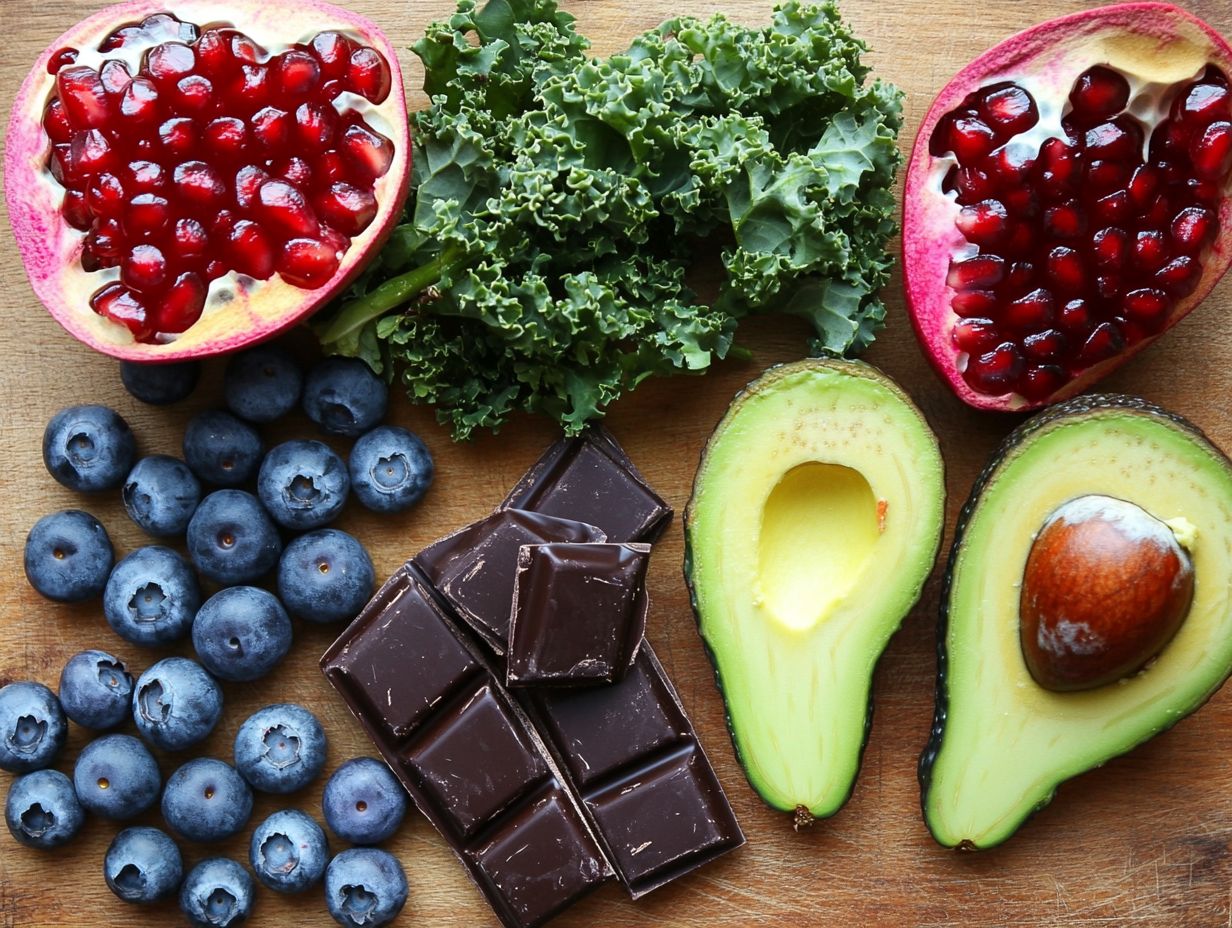
What are some foods that are high in antioxidants?
- Berries
- Dark chocolate
- Pecans
- Artichokes
- Kidney beans
Start including antioxidant-rich foods in your diet today for a healthier, more vibrant life!
Why are antioxidants important for our health?
Antioxidants protect our cells from damage caused by free radicals. These harmful molecules can cause long-term illnesses and premature aging.
How many servings of these antioxidant-rich foods should I consume?
Aim for at least five servings of colorful fruits and veggies every day for the best health!
Can I get enough antioxidants from supplements?
Supplements may help, but getting antioxidants from whole foods is better. Whole foods contain healthy ingredients that support overall wellness.
What are the other benefits of eating foods high in antioxidants?
These foods improve heart health and boost the immune system. They can also enhance your skin’s appearance.
Can I enjoy these foods if I have food allergies or dietary restrictions?
Absolutely! Many antioxidant-rich foods suit various dietary needs. For instance, gluten-free grains like quinoa and buckwheat are great options.

